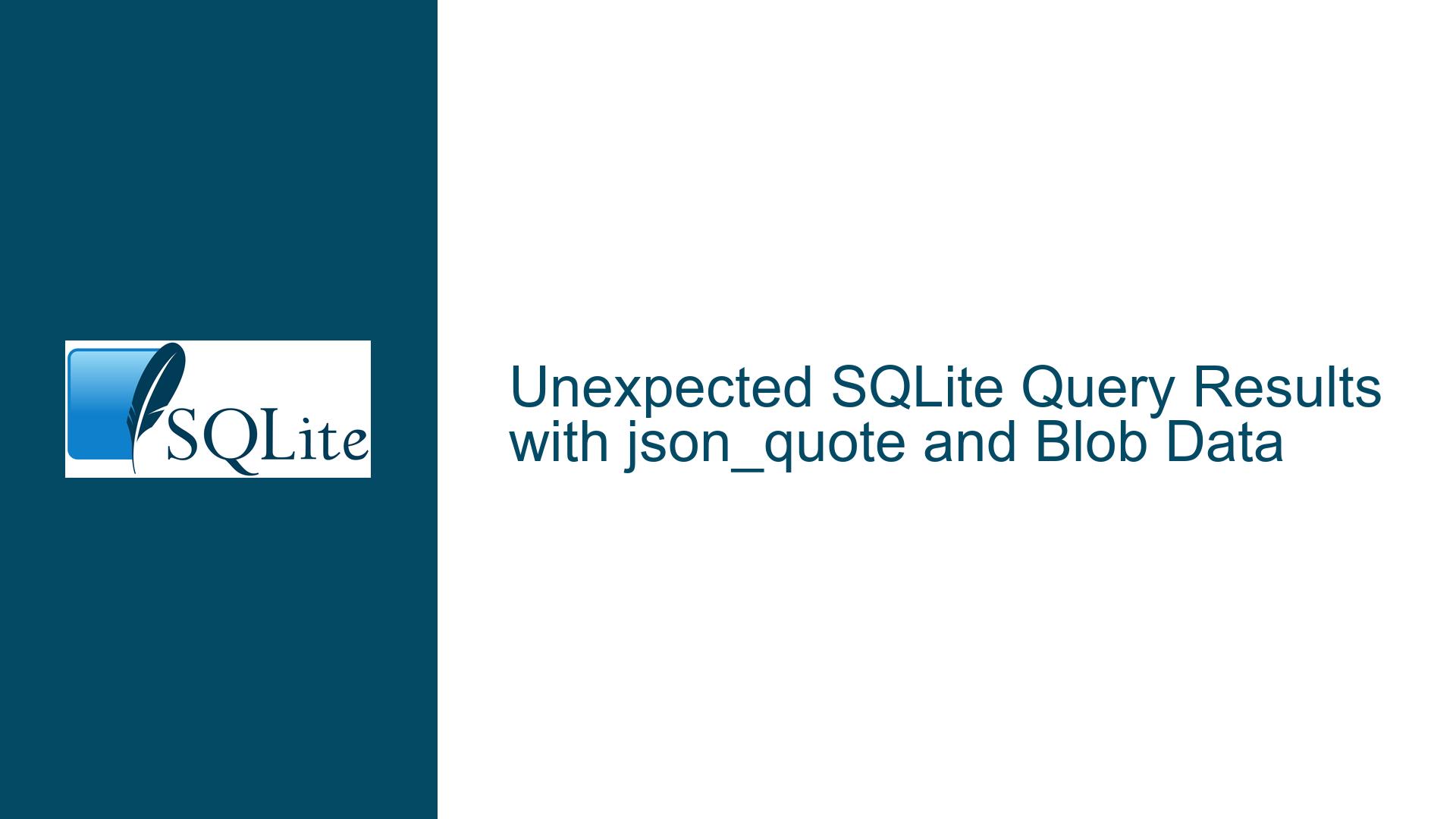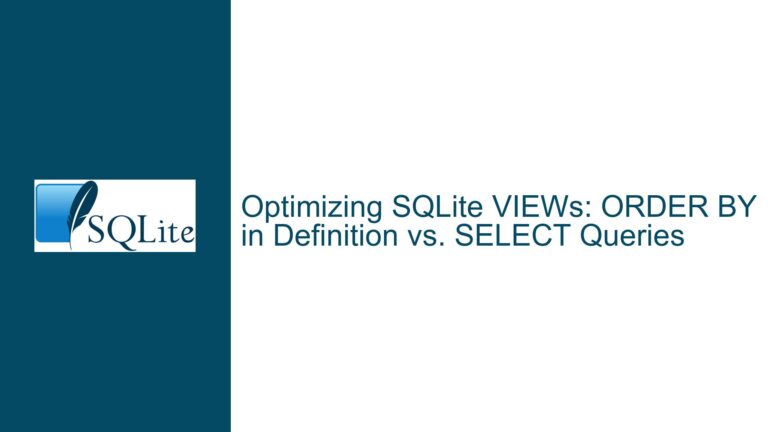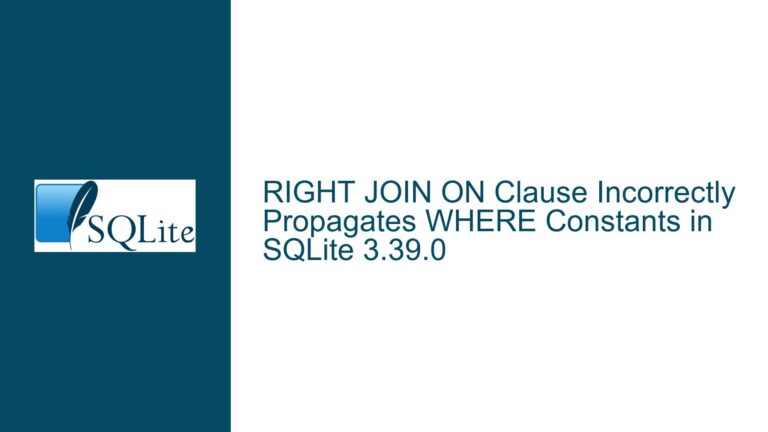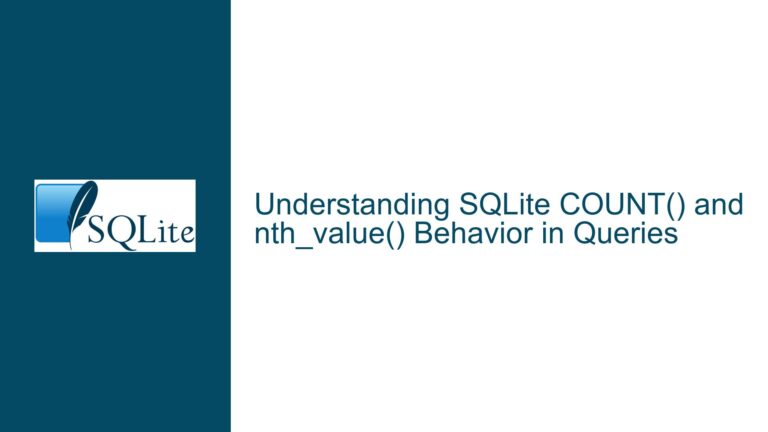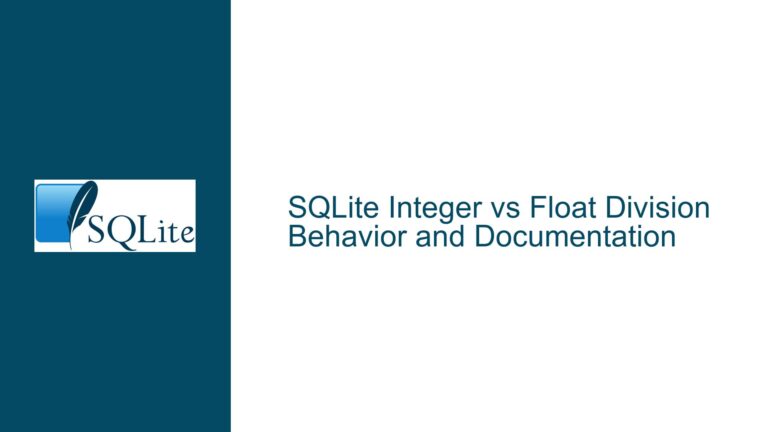Unexpected SQLite Query Results with json_quote and Blob Data
Understanding Partial Results and Transaction Rollbacks in SQLite Queries
The core issue revolves around unexpected query results and error propagation when using the json_quote function in SQLite, particularly when interacting with mixed data types such as integers and blobs. This behavior manifests differently in SELECT versus UPDATE statements, leading to confusion about SQLite’s error-handling mechanics. Below is a structured analysis of the problem, its root causes, and actionable solutions.
Behavior of SQLite Functions and Error Propagation
Key Observations
Partial Results in
SELECTStatements:
ASELECTquery returns a valid result for the first row but throws an error when processing the second row. For example:SELECT c0 FROM t0 WHERE NOT json_quote(t0.c0);This returns
0(from the first row) but raises an error for the second row containing a blob (x'').Complete Rollback in
UPDATEStatements:
AnUPDATEquery fails to modify any rows, even those that would otherwise satisfy the condition, if an error occurs during processing. For example:UPDATE t0 SET c0 = 1 WHERE NOT json_quote(t0.c0);This statement aborts entirely, leaving no rows updated.
Data Type Sensitivity of
json_quote:
Thejson_quotefunction operates strictly on JSON-compatible types (text, numbers, null, JSON objects/arrays). Blobs are not supported in JSON and trigger an error when passed tojson_quote.
Underlying Mechanics
Row-by-Row Processing in
SELECT:
SQLite processesSELECTqueries incrementally, emitting results to the client as each row is evaluated. If an error occurs after some rows have already been returned, those results remain visible to the client. This is why the first row (0) appears before the error on the second row.Atomic Execution of DML Statements:
Data Manipulation Language (DML) statements likeUPDATEorINSERTrun within an implicit transaction. If any row processing fails, the entire statement is rolled back. This atomicity ensures data consistency but means that valid rows are not processed if an error occurs elsewhere.Strict Type Enforcement in JSON Functions:
SQLite’s JSON functions, includingjson_quote, enforce type compatibility. Blobs lack a JSON representation, and passing them tojson_quoteviolates this constraint, forcing an immediate error.
Root Causes of Unexpected Results and Errors
1. Implicit Data Type Conversions and Column Affinity
SQLite uses dynamic typing, allowing columns to store any data type. The c0 column in t0 is defined as INT but accepts blobs due to SQLite’s type affinity rules. The insertion of x'' (a blob) into an INT column is permitted, but this value remains a blob unless explicitly converted. When json_quote encounters the blob, it cannot process it, triggering an error.
2. Error Handling Differences Between Query Types
SELECTStatements:
Errors duringSELECTexecution do not roll back already emitted rows. The client receives partial results followed by an error message.- DML Statements:
Errors inUPDATE,INSERT, orDELETEabort the entire operation. No partial changes are applied, even if some rows were processed successfully before the error.
3. Transaction Boundaries and Atomicity
SQLite wraps DML statements in implicit transactions. For example, an UPDATE affecting multiple rows is atomic: either all changes succeed, or none do. This contrasts with SELECT, which has no transactional side effects and streams results incrementally.
4. Function Execution Context
The json_quote function is evaluated during the WHERE clause filtering. If it raises an error for any row, the entire filtering process halts. In SELECT, this means partial results; in UPDATE, it aborts the entire statement.
Resolving Errors and Ensuring Consistent Query Behavior
Step 1: Validate Input Data Types
Prevent invalid data from entering the table by enforcing type constraints:
CREATE TABLE t0 (
c0 INT CHECK (typeof(c0) IN ('integer', 'real', 'text', 'null'))
);
This CHECK constraint rejects blobs and ensures c0 contains only JSON-compatible types.
Step 2: Explicit Type Conversion in Queries
Use CAST or typeof to handle mixed-type columns safely:
SELECT c0 FROM t0
WHERE NOT json_quote(CAST(c0 AS TEXT));
This converts blobs to text (e.g., x'' becomes ''), avoiding json_quote errors. Note that blobs cast to text may produce unintended results, so filtering them out first is preferable.
Step 3: Handle Errors Per-Row with CASE
Use conditional logic to bypass invalid rows:
SELECT c0 FROM t0
WHERE NOT CASE
WHEN typeof(c0) = 'blob' THEN NULL
ELSE json_quote(c0)
END;
This returns NULL for blobs, effectively excluding them from the WHERE condition without raising an error.
Step 4: Use Transactions Explicitly for DML Statements
For UPDATE operations, split the work into smaller transactions to isolate errors:
BEGIN TRANSACTION;
UPDATE t0 SET c0 = 1
WHERE rowid = 1 AND NOT json_quote(c0); -- Process first row
COMMIT;
BEGIN TRANSACTION;
UPDATE t0 SET c0 = 1
WHERE rowid = 2 AND NOT json_quote(c0); -- Process second row
COMMIT;
This approach allows partial updates but requires manual error handling.
Step 5: Replace json_quote with Custom JSON Handling
For columns that may contain blobs, use a custom JSON conversion strategy:
SELECT c0 FROM t0
WHERE NOT json_quote(
CASE
WHEN typeof(c0) = 'blob' THEN hex(c0)
ELSE c0
END
);
This converts blobs to their hexadecimal string representation, making them compatible with json_quote.
Step 6: Query Data Type Information Before Execution
Inspect the typeof function to identify problematic rows:
SELECT rowid, typeof(c0) FROM t0;
Use this to filter out blobs before applying json_quote:
UPDATE t0 SET c0 = 1
WHERE typeof(c0) != 'blob' AND NOT json_quote(c0);
Step 7: Adjust Client-Side Error Handling
Configure your SQLite client/library to:
- Buffer all
SELECTresults before displaying them, ensuring errors are reported before any output. - Retry failed DML statements after addressing the root cause (e.g., deleting invalid rows).
Step 8: Utilize SQLite Extensions or Alternatives
Consider extensions like JSON1 (already included in most builds) for enhanced JSON support, or switch to a TEXT column with application-level validation to avoid blobs entirely.
Summary of Key Takeaways
- Data Type Vigilance: SQLite’s type flexibility requires proactive validation to avoid incompatibilities with functions like
json_quote. - Error Handling by Query Type:
SELECTmay return partial results; DML statements fail atomically. - Defensive Query Design: Use
typeof,CAST, andCASEto handle mixed data types gracefully. - Explicit Transactions: Manage error-prone operations in smaller, isolated transactions for finer control.
By addressing data type mismatches and leveraging SQLite’s dynamic typing intentionally, developers can avoid unexpected errors and achieve consistent query results.
